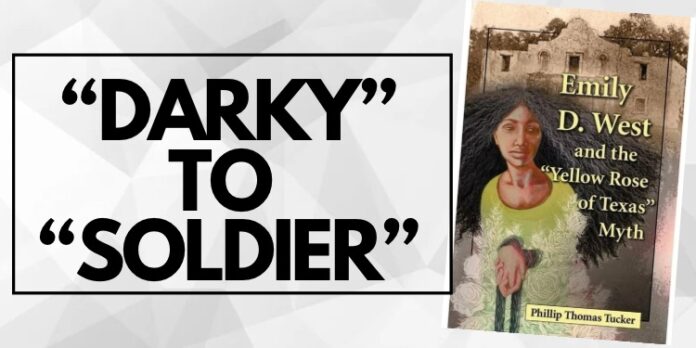Yellow Rose Lies
The song called the “Yellow Rose of Texas” was written by racists and changed over the years. The lyrics were changed over time as the word “Soldier” replaced “darky.” And the first line of the chorus was also changed to read, “She’s the sweetest little flower….” For generations, the Yellow Rose of Texas has been one of America’s most popular myths, connected to Texas and San Antonio, ballooning over time and doing little to resemble the truth of what happened on April 21, 1836, at the battle of San Jacinto, where a new Texas Republic won its independence and created a slave republic. The woman who has been traditionally connected to the story was an ordinary remarkable free black woman from the North, Emily D. West who never had a sexual relationship with Santa Anna. This was a total racist lie.
When you live in Texas seething with accepted racism, invented stories appear to supply the idea of racial superiority. Racial myth even has tourist value. In San Antonio, this has even taken the form of naming a hotel after Emily Morgan (West), an idea that reinforces the other myth—that of the Alamo, for the hotel is directly across the street. Racial myth and racist history remains an almost permanent structure of thought that is transmitted from one generation to the next, carried like a mental Trojan horse, hibernating, embedded in the minds of millions, and hidden in bedtime stories and old grandpa mythical tales that are highly infectious. The ignorant Alamo historians run around telling stories that old racist liars told them.
After the Battle of the Alamo, which was little more than a small skirmish, with the Alamo defenders being killed within 30 minutes (of those that did not run), thousands of Anglos began running in what became known as the “runaway scrape.” Anglo settlers picked up everything they owned and headed toward Louisiana. It was here that Emily West (Morgan), from the New Washington Hotel in then Mexico (now Texas) saw the running white settlers as Santa Anna’s army was in pursuit. Emily West would have known that Blacks were being freed everywhere Santa Anna went to drive slave owners out. The Yellow Rose of Texas song was actually a slave song brought from Louisiana with these words: “There’s a yellow rose in Texas, that I am going to see, No other darky [sic] knows her, no darky only me She cryed [sic] so when I left her it like to broke my heart, And if I ever find her, we nevermore will part. She’s the sweetest rose of color this darky ever knew, Her eyes are bright as diamonds, they sparkle like the dew; You may talk about your Dearest May, and sing of Rosa Lee, But the Yellow Rose of Texas beats the belles of Tennessee.”
The earliest known version of the song is found in Christy’s Plantation Melodies, a songbook published in Philadelphia in 1853. Christy was the founder of the racist blackface minstrel show known as the Christy’s Minstrels. These racist actors presented Black stereotypes and like most minstrel songs, the lyrics are written in a cross between the dialect historically spoken by African-Americans and standard American English. The song is written from the perspective of an African-American singer who refers to himself in racist terminology as a “darkey,” longing to return to “a yellow girl,” a term used to describe a light-skinned mulatto woman. The song had nothing to do with Emily West, but this was the type of racist buffoonery that ruled Texas.








